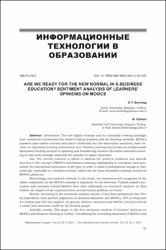ARE WE READY FOR THE NEW NORMAL IN E-BUSINESS EDUCATION? SENTIMENT ANALYSIS OF LEARNERS' OPINIONS ON MOOCS
Abstract
Introduction. The new digital economy and its constantly evolving paradigm have completely transformed the model of doing business and the learning methods. MOOCs (massive-open-online-courses) and micro-credentials are the educations interfaces, have become an important teaching environment tool. Distance learning has become an indispensable alternative teaching method in updating and transferring classical education materials according to real-world settings, especially for learners in higher education.
Aim. The current research is aimed to address the society's readiness and attitude direction to the concept of MOOCs and distance learning, highlighting its emergence and inevitability for educational institutions of all types in order to make a fundamental change in their curricula, especially in e-business courses, which are the most demanded training courses on MOOCs platforms.
Methodology and research methods. In the study, the awareness and recognition of the online community on the MOOCs concept is examined. in this direction, Turkish people's perception and attitudes toward MOOCs have been addressed via sentiment analysis on Eksi Sozluk, the largest social communication and discussion platform in Turkey.
Results. According to the sentiment analysis results, it has been determined that 52% of respondents have positive judgments on distance education and MOOCs, 29% of responses are neutral and 18% are negative. In general, distance education and MOOCs are perceived as a useful new education model by the Turkish people.
Scientific novelty. This paper is the first sentiment analysis of learners' opinions on MOOCs and distance learning in Turkey. Considering the increasing awareness of MOOCs and the need for e-business education, as the most demanded type of MOOCs, this is the first study investigating the priority of these two phenomena within the context of COVID-19.
Practical significance. It is thought that this study will contribute to the stakeholders in terms of showing how MOOCs and micro-credentials have a high potential to understanding trends in education especially in the new normal after the COVID-19 pandemic. The holistic education model of institutions has difficulty meeting the competitive nature and result-oriented approach of the e-business ecosystem. This market reality requires the institutions to offer more to-the-point and applied education solutions. In terms of e-business (e-commerce, digital marketing) education, the importance of MOOCs as a solution-focused on "how" rather than "what." has been comprehensively discussed in the paper.


















